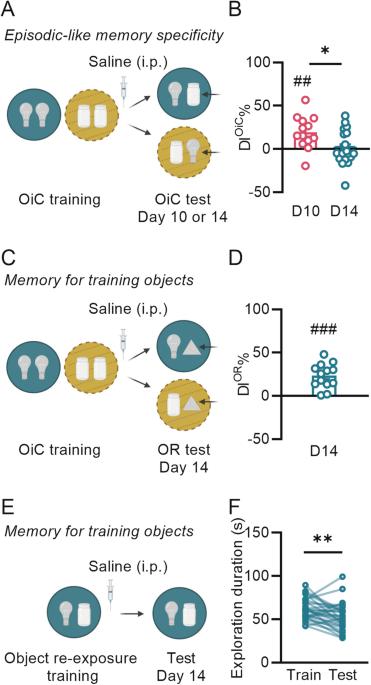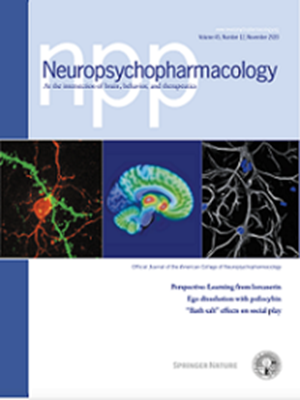Posttraining noradrenergic stimulation maintains hippocampal engram reactivation and episodic-like specificity of remote memory
IF 6.6
1区 医学
Q1 NEUROSCIENCES
引用次数: 0
Abstract
Recent findings indicate that noradrenergic arousal maintains long-term episodic-like specificity of memory. However, the neural mechanism of how norepinephrine can alter the temporal dynamics of systems consolidation to maintain hippocampus dependency of remote memory is currently unknown. Memories are stored within ensembles of neurons that become activated during learning and display strengthened mutual plasticity and connectivity. This strengthened connectivity is believed to guide the coordinated reactivation of these neurons upon subsequent memory recall. Here, we used male transgenic FosTRAP2xtdTomato mice to investigate whether the noradrenergic stimulant yohimbine administered systemically immediately after an episodic-like object-in-context training experience maintained long-term memory specificity which was joined by an enhanced reactivation of training-activated cells within the hippocampus during remote retention testing. We found that saline-treated control mice time-dependently lost their episodic-like specificity of memory, which was associated with a shift in neuronal reactivation from the dorsal hippocampus to the prelimbic cortex at a 14-day retention test. Importantly, yohimbine-treated mice maintained episodic-like specificity of remote memory and retained high neuronal reactivation within the dorsal hippocampus, without a time-dependent increase in prelimbic cortex reactivation. These findings suggest that noradrenergic arousal shortly after training maintains episodic-like specificity of remote memory by strengthening the connectivity between training-activated hippocampal cells during consolidation, and provide a cellular model of how emotional memories remain vivid and detailed.

训练后去甲肾上腺素能刺激维持海马印痕再激活和远端记忆的情景样特异性。
最近的研究结果表明,去甲肾上腺素能唤醒维持长期情景样特异性记忆。然而,去甲肾上腺素如何改变系统巩固的时间动态以维持海马对远程记忆的依赖的神经机制目前尚不清楚。记忆储存在神经元的集合中,神经元在学习过程中被激活,并表现出增强的相互可塑性和连通性。这种增强的连通性被认为在随后的记忆回忆中指导这些神经元的协调再激活。在这里,我们使用雄性转基因FosTRAP2xtdTomato小鼠来研究在情景样情境中物体训练经历后立即全身给予去甲肾上腺素能兴奋剂育亨宾是否能维持长期记忆特异性,这与在远程记忆测试中海马内训练激活细胞的增强再激活相结合。我们发现,在为期14天的记忆保留测试中,经盐水处理的对照组小鼠失去了时间依赖性的情景样特异性记忆,这与海马背侧向前边缘皮层的神经元再激活转移有关。重要的是,育亨宾处理的小鼠保持了远端记忆的情景样特异性,并在海马背侧保持了高神经元再激活,没有时间依赖性的前边缘皮层再激活增加。这些发现表明,训练后不久的去甲肾上腺素能唤醒通过加强训练激活的海马细胞在巩固过程中的连接,维持了远程记忆的情景样特异性,并提供了情感记忆如何保持生动和详细的细胞模型。
本文章由计算机程序翻译,如有差异,请以英文原文为准。
求助全文
约1分钟内获得全文
求助全文
来源期刊

Neuropsychopharmacology
医学-精神病学
CiteScore
15.00
自引率
2.60%
发文量
240
审稿时长
2 months
期刊介绍:
Neuropsychopharmacology is a reputable international scientific journal that serves as the official publication of the American College of Neuropsychopharmacology (ACNP). The journal's primary focus is on research that enhances our knowledge of the brain and behavior, with a particular emphasis on the molecular, cellular, physiological, and psychological aspects of substances that affect the central nervous system (CNS). It also aims to identify new molecular targets for the development of future drugs.
The journal prioritizes original research reports, but it also welcomes mini-reviews and perspectives, which are often solicited by the editorial office. These types of articles provide valuable insights and syntheses of current research trends and future directions in the field of neuroscience and pharmacology.
 求助内容:
求助内容: 应助结果提醒方式:
应助结果提醒方式:


